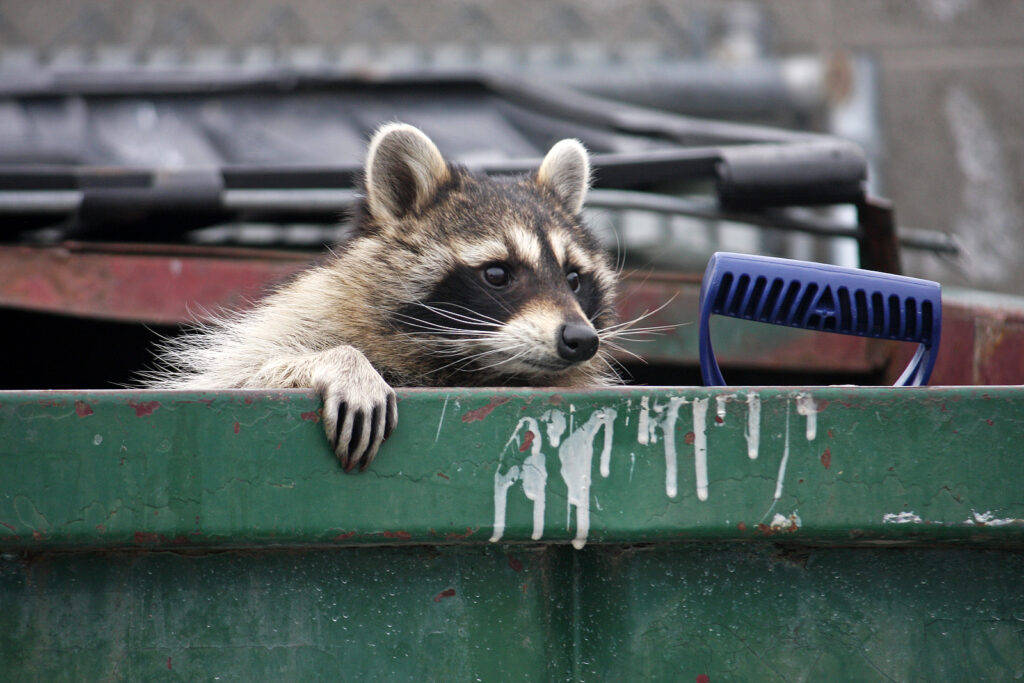Raccoons can cause a lot of trouble for both home and business owners. Their high level of intelligence gives them an advantage in the scavenger world, while their dexterous, human-like paws give them the ability to grip, grasp, pry, and pull. These attributes make them the perfect storm in terms of residential and commercial pests.
If you are currently dealing with a nuisance raccoon problem or have noticed in increase in raccoon visits on your property or in your community, it is important to take the right precautions and implement the most responsible protections.
Continue reading to learn some basic facts about raccoons that will help you better understand their behaviors and give you the tools necessary to raccoon-proof your property against tampering and intrusions.

Information About Raccoon Pests
What They Look Like
Raccoons come in all different sizes, shapes, colors, and more, depending on which region of the world they are from. Here in the Smoky Mountain region, the Common raccoon is usually a combination of muted colors, including gray, brown, white, and black. They have large, furry tails that are striped with black rings. Aside from their ringed tails, their most distinguishable trait is a black patch of fur around their eyes that resembles a burglar’s mask. Raccoon offspring are born without ring tails and black mask, as these traits develop as they get older. At full maturity, an adult raccoon is similar in size to a large house cat and weighs between 15 to 40 pounds.
Where They Live
Raccoons, like most mammals in Tennessee, prefer to live near water sources and forested areas. They will make their dens inside hollow trees or brush piles, or simply use dens that were previously dug by other animals. In populated areas, raccoons are known to use residential and commercial properties as a means of shelter. Attics, basements, garages, porches, crawl spaces, and roofs are some common areas where raccoons are found. They can cause an extreme amount of damage, which is why this behavior has classified them as a nuisance animal in these areas.
How They Behave
To each other, raccoons will chirp, purr, and grunt as a means of communication. In situations where raccoons feel threatened or scared, they will often hiss, snort, and growl. Many people assume raccoons in Tennessee are dangerous, but they will not attack unless they are sick, nursing young, or provoked in some way. In everyday life, raccoons are nocturnal, so they are only active at night. During active hours, they often hunt for food, but certain times of the year, they will also be on the lookout for warmer shelters. As mentioned earlier, they have highly dexterous paws and sharp claws, which gives them amazing climbing abilities. You will often spot raccoons high up in trees, on roofs, and more.
What They Eat
Raccoons are omnivores just like us. They eat animals, plants, legumes, and more. The most common foods eaten by raccoons in Tennessee include eggs, clams, fish, snails, beetles, insects, larva, nuts, seeds, fruits, vegetables, and even small birds and amphibians. In populated areas, raccoons are known to love pet food and garbage, so be careful leaving your trashcans out overnight. If you watch a raccoon eating near a body of water, it will look as though they are “washing” their meal, but really, they are just using their highly sensitive paws to better identify whatever it is they are about to eat.
When They Breed
Raccoons generally mate in the early spring, so you can expect late spring and early summer births. Female raccoons have a short gestation period, around 60 days, and can birth anywhere from one to five pups at a time. Raccoon babies are called “kits”, or more informally, “pups.” Pups stay with their mothers until the next spring, in which time they have learned to climb, feed, and care for themselves.
Why They are a Nuisance
Because of their high intelligence, climbing skills, and human-like paws that can grab hold of anything, raccoons are consequently a highly-destructive animal. They are known to dig up lawns in search of grubs, pillage chicken coops, destroy gardens and potted plants, pry open porch boards for access below, rip off roof shingles and siding, and much more. But above all else, they are most notorious for causing a large mess out of trashcans and dumpster containers. They will even eat pet food and livestock feed. These raccoon damages are more than just structural and costly, they are also a safety and health risk.
How to Get Rid of Them
If you have a nuisance raccoon problem in the Tennessee or Smoky Mountain regions, act now and hire a professional operator for safe critter control assistance. Contact Smoky Wildlife Control at 615-610-0962 for affordable raccoon removal services in Nashville, Tennessee and its surrounding counties. We provide residential and commercial work.
Related Posts:
The Top 4 Methods to Get Rid of Raccoons
Make This Non-Lethal Animal Repellent Recipe to Get Rid of Raccoons
What You Need to Know About Raccoons in the Attic
